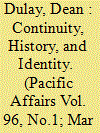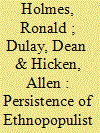|
|
|
Sort Order |
|
|
|
Items / Page
|
|
|
|
|
|
|
| Srl | Item |
| 1 |
ID:
189558


|
|
|
|
|
| Summary/Abstract |
In May of 2022, Bongbong Marcos won a commanding 59 percent of the vote to become president of the Philippines. His victory was, on some level, shocking to scholars and analysts of Philippine politics. As a result, a plethora of different theories have been proposed, in an attempt to explain why Marcos won. In this paper, we use nationally representative survey data to explore which factors predict (and do not predict) voting intention for Marcos. We find that, a) support for former President Rodrigo Duterte, b) positive perceptions of the late President Ferdinand Marcos and martial law, and c) ethnic (linguistic) identity are strong predictors of voting for Bongbong Marcos. On the other hand, age, education, and income are not. Consequently, theories based on continuity, coalition, history, and identity provide the most leverage on the question of why Bongbong Marcos won the election.
|
|
|
|
|
|
|
|
|
|
|
|
|
|
|
|
| 2 |
ID:
189050


|
|
|
|
|
| Summary/Abstract |
The past few years have seen an emergence of populist leaders around the world, who have not only accrued but also maintained support despite rampant criticism, governance failures, and the ongoing COVID pandemic. The Philippines’ Rodrigo Duterte is the best illustration of this trend, with approval ratings rarely dipping below 80 percent. What explains his high levels of robust public support? We argue that Duterte is an ethnopopulist who uses ethnic appeals in combination with insider vs. outsider rhetoric to garner and maintain public support. Moreover, we argue that ethnic affiliation is a main driver of support for Duterte, and more important than alternative factors such as age, education, gender, or urban vs. rural divides. We provide evidence of Duterte's marriage of ethnic and populist appeals, then evaluate whether ethnicity predicts support for Duterte, using 15 rounds of nationally representative public opinion data. Identifying with a non-Tagalog ethnicity (like Duterte) leads to an 8 percent increase in approval for Duterte, significantly larger than any other explanatory factor. Among Duterte supporters, a non-Tagalog ethnicity is associated with 19 percent increase in strong versus mild support. Ethnicity is the only positive and significant result, suggesting that it strongly explains why Duterte's support remains robust. Alternative explanations, such as social desirability bias and alternative policy considerations, do not explain our results.
|
|
|
|
|
|
|
|
|
|
|
|
|
|
|
|
|
|
|
|
|